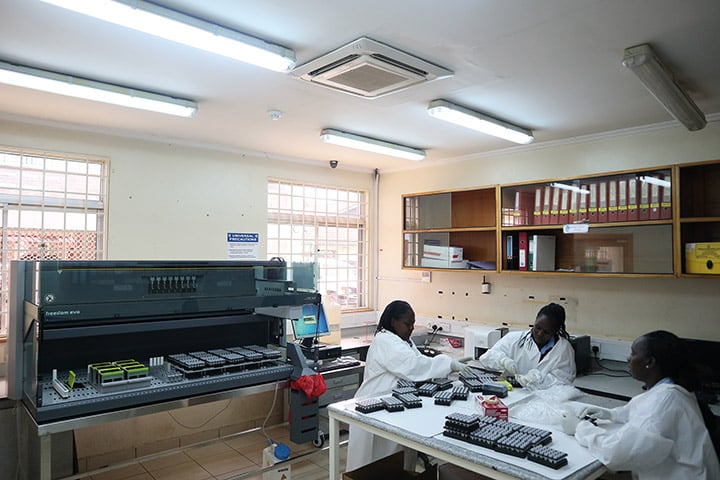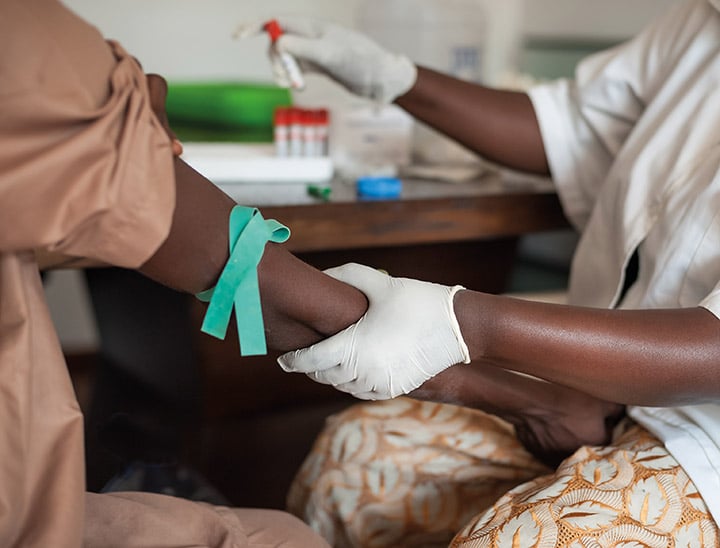Tecan uses cookies to improve our website. By continuing to browse our website, you accept our cookie policy.
Tecan uses cookies to improve our website. By continuing to browse our website, you accept our cookie policy.

Gaining an accurate diagnosis of HIV is essential to ensure that patients get the right treatment, and that the disease is contained as much as possible. In Kenya, where HIV is prevalent, the quality of testing across the country is being monitored through a program established in 2007 that sends out manually produced proficiency testing panels. The demand for this service has grown immensely with the development of point-of-care testing and, to address this, the National Public Health Laboratory has turned to automation to produce more samples in a shorter timeframe and with improved accuracy.
An estimated 1.5 million people in Kenya are living with HIV, making efficient and accurate diagnosis essential in order to effectively treat patients and keep the disease under control. The recent introduction of rapid HIV testing (RHT) at the point of patient care has meant that screening is far more widely available across the country. However, because diagnostic methods are far simpler than before, much of the analysis is now performed by healthcare workers with varying degrees of training and skill. As a result, the risk of misdiagnosis of HIV status has increased, as Sophie Mwanyumba, Production Manager for the Ministry of Health, discussed: “Accurate HIV detection is incredibly important; wrongly diagnosing someone as HIV positive when they are actually negative can potentially lead to distressing domestic issues on an individual basis, and there have been cases in the past where legal action has been taken because of a false positive result. Equally importantly – and although research is limited – it is evident that false negative results could potentially lead to a public health disaster.”

The Freedom EVO platform has transformed the production of proficiency testing panels at Kenya’s National Public Health Laboratory
“In 2007, we implemented a national proficiency program that significantly improved quality assurance for HIV diagnostics. To begin with, just 24 facilities took part, however, since then, testing has spread out to the point of patient care as well as the traditional central laboratories; the quality control service must now cover individual healthcare providers as well as larger facilities, and has grown to include over 20,000 participants, which is a huge increase! Twice a year, we prepare and send out six unknown positive and negative proficiency testing panels to each provider for routine testing using their usual methods. They then send us back their results and, from that, we can evaluate their accuracy, and provide corrective action guidance to those with incorrect results.”
Sophie continued: “For many years, we prepared the proficiency testing panels manually, carrying out the entire pipetting procedure by hand. There were, however, several drawbacks to this method: it took a long time to prepare the samples; manual errors were much more likely; and it was a very laborious process for skilled staff. In 2015, we acquired a Freedom EVO® 200 system with the aim of speeding up and improving the sample production workflow. Some members of the team were apprehensive at first as they were so used to performing everything manually, but the Tecan team was very helpful and supportive, working with us directly to train our staff and on-site engineers so that we could all use the system fully and effectively. Now, it is fantastic; the platform has really given us the upper hand in production quality, helping us to prepare accurate volumes and ensure the samples are dispensed correctly. We can dispense 14,400 samples in a period of only two hours, compared to manually pipetting just 2,000 samples in the same time frame. Overall, it takes around two weeks to complete the whole process. Even though the workflow is not yet fully automated, having the platform has already reduced the entire sample preparation turnaround time from three months to only one, and we still have the capacity to do more.”
The platform has really given us the upper hand in production quality, helping us to prepare accurate volumes and ensure the samples are dispensed correctly.
“The proficiency testing program, aided by automation, has been revolutionary in enabling us to assure the quality of RHT across Kenya, and this has led to huge improvements. There has been a progressive downward trend in the percentage of incorrect results reported by service providers; it is now less than five percent. Looking forward, we are planning to expand our proficiency testing program and use the system for quality assurance of hepatitis B and syphilis screening. Thanks to the Freedom EVO, we have the opportunity to enhance quality assurance for many biomarkers in the future,” Sophie concluded.

To find out more about the Freedom EVO 200, visit https://lifesciences.tecan.com/freedom-evo-platform
To learn more about the National Public Health Laboratory in Kenya, go to nphl.go.ke